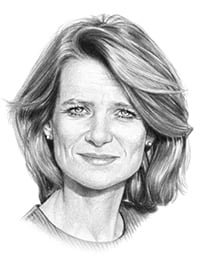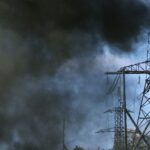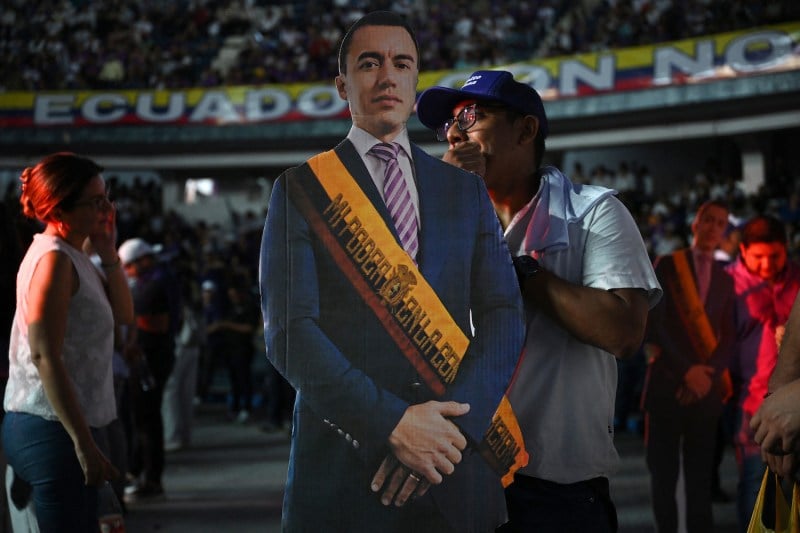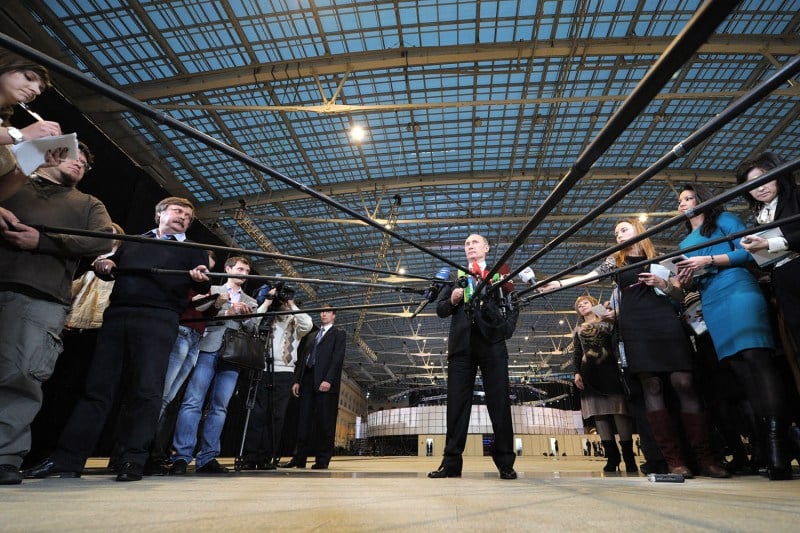Europe Is Now Led by Its North

Europe Is Now Led by Its North
The Nordics and Baltics are together inspiring visions of a stronger continent.
Ukrainian President Volodymyr Zelenskyy talks to a group of European leaders in the sideline at the Support Ukraine Summit in Kyiv on the third anniversary of Russia’s full-scale invasion of Ukraine on Monday Feb 24, 2025. Gitanas Nausėda HANDOUT via EYEPRESS
One photo captures it all: European leaders visiting Kyiv on the third anniversary of the Russian invasion, sitting in a close circle with Ukrainian President Volodymyr Zelensky. The light is warm, dimmed. All sit on the edge of their chairs, leaning forward, their heads closely together, listening to Zelensky. No one looks depressed or anxious; on the contrary, it is clear they share a common mission. All look focused on the future. In short, they look like family.
Almost all of the pictured leaders were from Northern Europe and the Baltic countries, also known as NB8—the Nordic-Baltic Eight. In Kyiv, they were joined by the European Commission president and the Canadian and Spanish prime ministers.
One photo captures it all: European leaders visiting Kyiv on the third anniversary of the Russian invasion, sitting in a close circle with Ukrainian President Volodymyr Zelensky. The light is warm, dimmed. All sit on the edge of their chairs, leaning forward, their heads closely together, listening to Zelensky. No one looks depressed or anxious; on the contrary, it is clear they share a common mission. All look focused on the future. In short, they look like family.
Almost all of the pictured leaders were from Northern Europe and the Baltic countries, also known as NB8—the Nordic-Baltic Eight. In Kyiv, they were joined by the European Commission president and the Canadian and Spanish prime ministers.
It was a geopolitical statement—one that was more remarkable for being made by Nordic-Baltic states. For decades, most Nordic policymakers considered Europe to be not much more than a market. More often than not, they were known for putting a brake on integration, rather than furthering it. As for the Baltic states, until Russia’s invasion in Ukraine they were often referred to as the “new countries,” even though all three—Estonia, Latvia, and Lithuania—joined both NATO and the European Union in 2004.
Now, recognizing Ukraine’s struggle for survival under Russian onslaught, the Nordics and Baltics have changed course. Not only are they now interested in more European integration, but they are also finding their voice and beginning to take initiative. For the first time since the start of European integration in the early 1950s, they are taking the lead on common issues such as security and defense. The meeting in Kyiv on Feb. 24 was just one example.
Perhaps the most important shift has taken place in Denmark. The country became a member of the EU in 1973, together with the United Kingdom—and on much the same terms. Denmark always took a liberal, market-oriented approach in Europe. It has opt-outs on the euro, European citizenship, and EU laws concerning justice and home affairs. It used to have one for European defense, too. During the COVID-19 pandemic, Denmark was the staunchest member of the “frugal” group resisting (in vain) the use of common European loans, or Eurobonds. After Russia’s invasion in Ukraine in 2022, however, Copenhagen’s position changed radically. With Russia stepping up hybrid attacks in the Baltic Sea, Danes voted to join European defense initiatives. And, in a 180-degree turn, Denmark has now also become a leading advocate for Eurobonds, so as to give the European weapons industry a much-needed boost.
Danish Prime Minister Mette Frederiksen was among the invitees to a European mini-summit in Paris on Feb. 17, organized by French President Emmanuel Macron, to discuss Europe’s security and defense after the U.S. delegation at the Munich Security Conference had cast severe doubts on the future of the trans-Atlantic relationship and NATO. Macron invited only Europe’s main players. During the meeting, Frederiksen spoke not only for Denmark but also, officially, for all the Nordic and Baltic states, including non-EU member Norway. Denmark may be small, but it occupies a prominent place in this debate. The country has given almost all of its heavy land-warfare equipment to Ukraine, has just sharply increased its defense budget, is one of the few speaking out on common debt, and is no longer proposing to trim the EU budget. As befits a leader, Frederiksen publicly discusses all these national U-turns, embedding them into a larger geopolitical and European narrative.
Sweden is a little less vocal about this narrative, but its shift is no less profound. Like Denmark, the country used to routinely oppose more European integration, except when it involved deepening the internal market or signing trade agreements with third countries. Now, with security threats multiplying in the Baltic and the High North, it feels exposed and has realized how vulnerable individual European countries are. Sweden became a member of NATO in 2024 and has also stepped up military preparedness with Norway and Finland in recent years, turning the entire northern region into an integrated, near-borderless zone. Going beyond security, this integration also involves academic cooperation and common infrastructural projects. In Brussels, Sweden’s liberal, pro-market, and open trade positions have softened somewhat.
In a way, diplomats say, Denmark and Sweden are now realizing why Finland has been a part of every aspect of European integration, from the Schengen area to the euro. Finland has always felt vulnerable due to its 830-mile border with Russia. Even if the border has been quiet for many decades, it was a tense quiet. Finns never forgot their two wars with Russia during World War II. They always knew that one day, a major geopolitical shift could have tectonic plates moving on that border again. This is why Finland has never cut military expenses so drastically, unlike Sweden and Denmark. It also kept educating its citizens to be resilient, just in case. During the eurocrisis in 2011, when asked why Finland ever joined the eurozone if it opposed most solutions to the Greek crisis, a Finnish official replied to me with one word: “Security.” Finland, he added, is a full member of the EU—no exceptions, no opt-outs, nothing. “Every layer of European integration is an another layer of security.”
This assessment now resonates throughout the entire NB8 region. All countries in this informal group have experience with Russian imperialism in one way or another, often traumatic. All see, as Danish Foreign Minister Lars Lokke Rasmussen wrote in the Financial Times recently, that with the war raging in Ukraine, “the future of European security hangs in the balance.” Together, the Nordic and Baltic countries are the second-largest military donor to Ukraine, after the United States. Rasmussen urged other European countries to step up their efforts, too, asking: “How can it be that eight small countries in northern Europe are leading in that support?”
The NB8 group flourished in the early 2000s, when the newly independent Baltic states sought assistance on democratic transition and economic integration from their Nordic neighbors. Over the years, it became a platform for the exchange of all kinds of information and experiences—on digitalization, climate measures, and increasingly also security. Russia’s invasion in Ukraine gave the NB8 a sudden, strong sense of purpose. Government officials meet regularly. The NB8 often issues common statements. During a private lunch, a Baltic official proudly said to me: “We have now become Nordics, too.”
Many Europeans are wondering these days how Europe can meet the immense challenge of providing defense and security without the United States. In some countries, people are rather downbeat. They fear pro-Russian populists, economic recession, and a divided Europe battered by external threats.
Interestingly, many people in the Nordics and Baltics—while closer to the fire—tend to be more cheerful. Instead of complaining and letting anxiety take over, they are showing an energetic, pro-European decisiveness that is not unlike the resolve the Dutch showed after the shock of Brexit. Seeing eye to eye in areas such as financial regulation, fiscal matters, trade, and climate, they are beginning to push for the implementation of the capital markets union and other European reforms. Together, they are Europe’s fifth-largest economy.
Officials such as Finnish President Alexander Stubb, EU foreign-policy chief Kaja Kallas (who is a former prime minister of Estonia), and Frederiksen are showing decisive leadership. They are sending substantial money and weapons to Ukraine, beefing up their own national defense, trying to together tackle Russia’s shadow oil fleet, working on digital resilience, and investing in Ukraine’s economy in preparation for its (real or de facto) EU membership. Moreover, they are gifted public speakers. While many European leaders try to avoid sensitive topics such as shifting funds from social welfare to defense, Nordic and Baltic leaders tackle them head-on, arguing that not letting Russia win the war in Ukraine is the cheapest and most effective way to contribute to a common security in Europe.
Their citizens seem to appreciate this frankness. Russian President Vladimir Putin has said he wants Eastern European countries to leave NATO. Few doubt that he also wants NATO’s newest members, Finland and Sweden, out. Many Nordic and Baltic citizens fear that if Ukraine loses the war, they may be next. Daily hybrid attacks on their infrastructure, media, companies, and public institutions deepen those fears. A recent Eurobarometer poll shows strong public support for financing the purchase of military equipment to Ukraine: 92 percent of Swedes, 88 percent of Danes and Finns, 76 percent of Lithuanians, 70 percent of Latvians, and 63 percent of Estonians support this—numbers that governments elsewhere in Europe can only dream about.
One corollary of this consensus seems to be that, at least in some NB8 countries, the pro-Russian, Trumpian far right is losing support. In Denmark, the decline is outright spectacular: The Danish People’s Party won the largest share of the vote in the 2014 European Parliament election, at nearly 27 percent, and less than 7 percent in 2024. And in Norway, where the far right left the government in January, a social-democratic minority government unreservedly supporting Ukraine is climbing in the polls. Norwegian far-right politician Christian Tybring-Gjedde, who once nominated Donald Trump for the Nobel Peace Prize, is now worried about Trump and his Ukraine policy. Meanwhile, support for EU accession is rising in Norway and Iceland. This proves once again that national leaders who speak frankly about Europe do not need to lose elections—they can actually win them.
Hopefully, the rest of Europe will take note.
Caroline de Gruyter is a columnist at Foreign Policy and a Europe correspondent and columnist for the Dutch newspaper NRC Handelsblad. She currently lives in Brussels. X: @CarolineGruyter
More from Foreign Policy
-

People stand in front of NATO headquarters in Brussels. It’s Time for Europe to Do the Unthinkable
Brussels has slavishly followed Washington for too long—and forgotten how to advance its own geopolitical interests.
-

Samuel Huntington holds his hand to his chin while sitting in an office. Samuel Huntington Is Getting His Revenge
The idea of a global “clash of civilizations” wasn’t wrong—it was just premature.
-

German Chancellor Olaf Scholz visits weapons maker Rheinmetall in Unterluess, Germany on Feb. 12, 2024. How Europe Can Defend Itself
Here are 10 steps European leaders can take now to bolster the continent’s defenses without U.S. help.
-

J.D. Vance gestures with both hands open as he speaks into a microphone during the Munich Security Conference. Vance wears a black suit with a blue tie. The New Meaning of ‘Munich’
After J.D. Vance’s bizarre speech, a word synonymous with appeasement may now signal the voluntary surrender of global hegemony.








Join the Conversation
Commenting on this and other recent articles is just one benefit of a Foreign Policy subscription.
Already a subscriber?
.
Subscribe
Subscribe
View Comments
Join the Conversation
Join the conversation on this and other recent Foreign Policy articles when you subscribe now.
Subscribe
Subscribe
Not your account?
View Comments
Join the Conversation
Please follow our comment guidelines, stay on topic, and be civil, courteous, and respectful of others’ beliefs.
Change your username |
Log out
Change your username:
CANCEL
Confirm your username to get started.
The default username below has been generated using the first name and last initial on your FP subscriber account. Usernames may be updated at any time and must not contain inappropriate or offensive language.